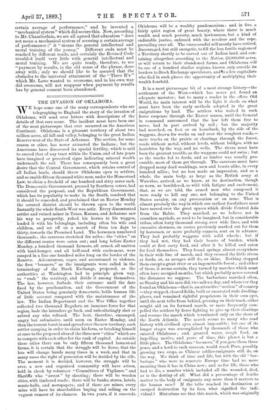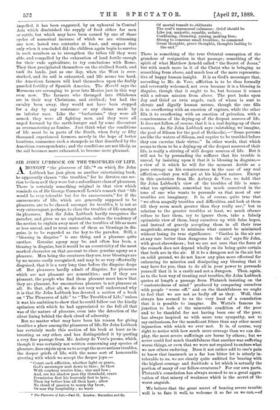THE INVASION OF OKLAHOMA.
VVhope some one of the many correspondents who are telegraphing to England the story of the invasion of Oklahoma, will send over letters with descriptions of the details of that rare scene. The incident must have been one of the most picturesque that ever occurred on the American Continent. Oklahoma is a pleasant territory of about two million acres, all hill and valley, belonging to the great Indian Reserve west of the State of Arkansas. The section, for some reason or other, has never attracted the Indians ; but the Americans have discovered its special fertility, which is said to exceed that of any tract within the Union, and of late years have imagined or perceived signs indicating mineral wealth underneath the soil. There has consequently been a great desire that the Central Government, which retains control of all Indian lands, should throw Oklahoma open to settlers, and so enable fifteen thousand white men, under the Homestead Law, to claim a freehold of one hundred and sixty acres each. The Democratic Government, pressed by Southern voters, had considered the proposal, and the Republican Government,
which has its popularity to make in the South, resolved that it should be conceded, and proclaimed that on Easter Monday the coveted district should be thrown open to the world.
Instantly the whole South-West was astir. Every discontented settler and ruined miner in Texas, Kansas, and Arkansas saw
his way to prosperity, yoked his horses to his waggon, loaded it with his belongings, including often his wife and children, and set off on a march of from ten days to thirty, towards the Promised Land. The horsemen numbered thousands ; the caravans stretched for miles ; the " cities " on the different routes were eaten out; and long before Easter Monday, a hundred thousand farmers, all armed, all smitten with land-hunger, and all half-mad with excitement, were camped in a line one hundred miles long on the border of the Reserve. Adventurous, eager, and accustomed to violence, the first " boomers," as the immigrants were called in the terminology of the Stock Exchange, proposed, as the authorities at Washington had in principle given way, to " rush " the territory, and divide it among themselves. The law, however, forbade their entrance until the date fixed by the proclamation, and the Government of the United States being genuinely democratic, holds human life of little account compared with the maintenance of the law. The Indian Department and the War Office together collected two thousand Regulars, an immense force for that region, bade the intruders go back, and unhesitatingly shot or sabred any who refused. The host, therefore, encamped, angry but submissive, until noon on Easter Monday, and then the torrent burst in and spread over the new territory, each settler camping in order to claim his farm, or betaking himself at once to the proposed sites of the three new " cities " which are to compete with each other for the rank of capital. As outside these cities there can be only fifteen thousand homestead farms, it is certain that the struggle will be fierce, that the lots will change hands many times in a week, and that in many cases the right of possession will be decided by the rifle. The moment it is decided, however, the straggle will be over, a new and organised community will have arisen, held in check by volunteer " Committees of Vigilance " and Sheriffs who " arrest " by shooting; there will be wooden cities, with timbered roads ; there will be banks, stores, hotels, music-halls, and newspapers ; and if there are mines, every mine will have its shareholders buying and selling on the vaguest rumour of its chances. In two years, if it succeeds, Oklahoma will be a wealthy pandemonium ; and in five, a fairly quiet region of great beauty, where there is much wealth and much poverty, much lawlessness, but a kind of endurable justice, enforced with the revolver and the rope, prevailing over all. The unsuccessful will mostly have retired, discouraged, but still energetic, to fill the less fertile regions of a Territory shortly to be carved out of Indian land, and con- taining altogether, according to the Nation, 23,000,000 acres, or will return to their abandoned farms, and Oklahoma will be one of a hundred similar regions, known only outside its borders to Stock Exchange speculators, andto a few capitalists who find in such places the opportunity of multiplying their wealth fourfold.
It is a most picturesque bit of a most strange history—the settlement of the West—which has never yet found an adequate narrator; but to many a reader in the effete Old World, its main interest will be the light it sheds on what must have been the early methods adopted in the great emigrations by land. The settlers who waited in such fierce suspense through the Easter season, until the General in command announced that the law left them free to move, had in part arrived by rail ; but the majority had marched, on foot or on horseback, by the side of the waggons, drawn for weeks on end over the roughest roads,— mere tracks on the prairie or clearings through the forest, roads without metal, without levels, without bridges, with no hostelries by the way, and no wells. The rivers must have been the greatest trouble, as the waggons could not swim ; but as the tracks led to fords, and as timber was usually pro- curable, most of them got through. The caravans must have dropped many dead weaklings, men and beasts alike, in every hundred miles ; but no loss made an impression, and as a whole, the main body, as large as the British army at Waterloo, arrived, as we know, at its destination, though so worn, so bewildered, so wild with fatigue and excitement, that, as we are told, the armed men who composed it were ready to kill any one, not belonging to the United States cavalry, on any provocation or on none. That is almost precisely the way in which our earliest forefathers must have moved over the great spaces which divide Central Asia from the Baltic. They marched, as we believe, not in countless myriads, as used to be imagined, but in considerable tribes, often forty thousand strong, over wide lines, and with excessive slowness, on routes previously marked out for them by horsemen, or more probably runners, sent on in advance. They had probably waggons with solid wheels ; but if they had not, they had their beasts of burden, which could at first carry food, and after it be killed and eaten for food themselves. They found springs almost everywhere in their wide line of march, and they crossed the little rivers at fords, or, as savages still do, on skins. Nothing stopped them except a great river or an impenetrable forest ; and either of these, it seems certain, they turned by marches which must often have occupied months, but which probably never covered the .distances we suppose. The barbarians marched often, as Stanley and his men did, two miles a day, and whenever they found an Oklahoma—that is, an attractive " section" of country —they stopped, cleared fields, built or excavated rude dwelling- places, and remained rightful proprietors in their own eyes, until the next tribe from behind, pressing on their track, either sought aid on its forward march, or more frequently com- pelled the settlers by fierce fighting to give up their clearings and resume the march which terminated only on the shore of the North Atlantic. The march seems to many who read history with civilised eyes, almost impossible ; but one of its longer stages was accomplished by thousands of those who entered Oklahoma ; and, granted water, rough food, an impelling motive, and years of time, this planet is but a little place. The Oklahoma " boomers," if you gave them three years, and a herd to each caravan, would reach Peru, possibly growing two crops, as Chinese soldier-emigrants still do, on the way. We think of time and life, but with the old " bar- barians " who were to renovate Europe time had no more meaning than it has in China now ; and as for life, those who had to die, a number which included all the wounded, died, as is the destiny of all. What did a per-tentage of deaths matter to the body of emigrants any more than it matters to the human race P If the tribe reached its destination or escaped destruction by its foes, what signified the indi- vidual ? Historians see that this march, which was originally
impelled, it has been suggested, by an upheaval in Central Asia which diminished the supply of food either for men or cattle, but which may have been caused by one of those cycles of numerical increase of which we are witnessing one now, lasted two centuries at least, and suspect that only when it concluded did the children again begin to survive in such numbers as to strengthen the tribes till they were able, and compelled by the exhaustion of land fertile enough for their rode agriculture, to try conclusions with Rome. They then precipitated themselves on the civilised South, and took its lands, just as one day, when the West is over- stocked, and its soil is exhausted, and life seems too hard, the American farmers will hurl themselves upon the feebly guarded fertility of Spanish America. The Herald says the Mormons are arranging to pour into Mexico just in this way even now. The farmers who thronged into Oklahoma are in their way Christians, and civilised ; but had the cavalry been away, they would not have been stopped for a day by any resistance or any claims made by an inferior race. Like the " barbarians," they were all armed, they were all fighting men, and they were all urged forward by the earth-hunger and by some discontent as overmastering as famine. Just think what the conditions of life must be in parts of the South, when forty or fifty thousand experienced farmers, merely in the hope of better locations, commence such a stampede as that described by the American correspondents ; and the conditions are not likely, as the soil becomes more exhausted, to become more pleasant.



































 Previous page
Previous page